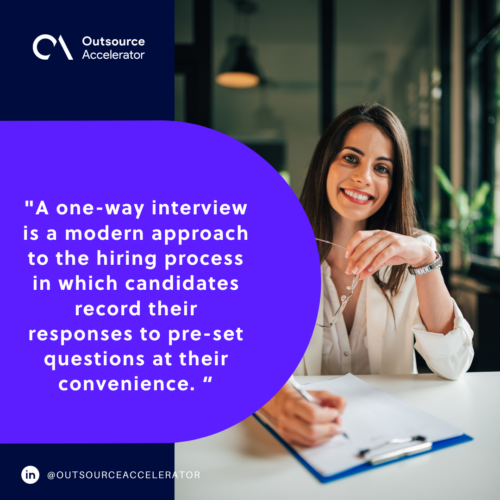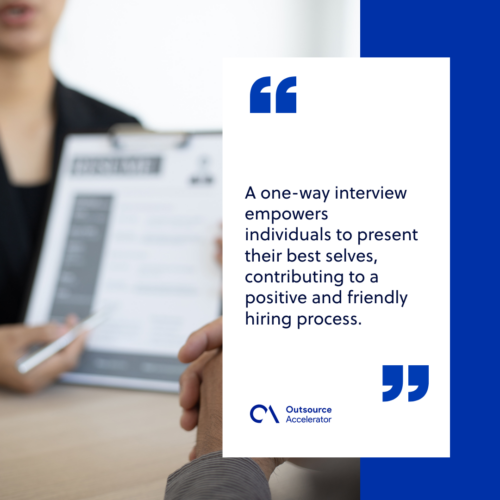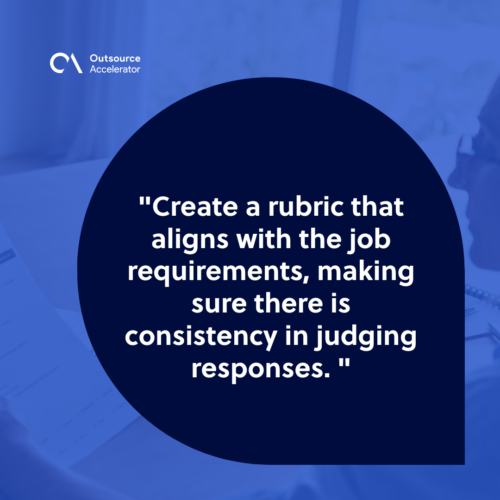One-way interview: Tips and sample questions

In the world of hiring, traditional interview processes are evolving to meet the demands of efficiency and global connectivity.
One such innovation is the “one-way interview.”
In this article, we’ll delve into what a one-way interview is and why companies are increasingly adopting this method. We will also provide valuable tips along with sample questions to make your screening process seamless.
What is a one-way interview?
A one-way interview is a modern approach to the hiring process in which candidates record their responses to pre-set questions at their convenience. Unlike traditional interviews, there is no real-time interaction with an interviewer.

Why do companies conduct a one-way interview?
Here are some reasons why companies choose this approach:
Efficiency
The first major advantage is efficiency. Traditional interviews often involve coordinating schedules, finding suitable time slots, and dealing with time zone differences.
One-way interview streamlines this process, allowing recruiters to review candidate responses at their own pace.
Consistency
Consistency is a crucial factor in the hiring process. Using another interview method carries the risk of variations in the questions asked or the way they are presented.
One-way interviews, on the other hand, guarantee that every candidate faces the same set of questions. This standardized approach promotes fair and unbiased evaluations, leading to better hiring decisions.
Global hiring
In our interconnected world, talent knows no borders. One-way interviews break down geographical barriers. Companies are given the opportunity to assess candidates from different time zones.
Technological advancements
Embracing technological advancements is a hallmark of successful companies.
A one-way interview leverages video platforms and automated systems, showcasing a commitment to innovation. It not only reflects positively on the company’s image but also aligns with the expectations of tech-savvy candidates.
Candidate experience
The candidate’s experience is a key consideration for any company aiming to attract top-tier talent.
A one-way interview offers candidates the flexibility to showcase their skills without the pressure of immediate responses. It empowers individuals to present their best selves, contributing to a positive and friendly hiring process.

Sample questions to ask in a one-way interview
Recruiters use strategic questions in a one-way interview to assess and identify the ideal talent.
Let’s break down how each question contributes to this crucial evaluation:
1. Can you please introduce yourself and give a summary of your professional experience?
This opening question serves as an essential icebreaker. Recruiters can gauge candidates’ communication skills and ability to present a concise overview of their professional journey.
Look for clarity, confidence, and a brief yet informative introduction that highlights relevant experiences.
2. Can you describe a specific project or accomplishment from your previous role that you are particularly proud of?
Recruiters aim to uncover a candidate’s achievements and contributions in their previous roles.
This question delves into the applicants’ accomplishments, providing insights into their skills, initiative, and impact.
The ideal response showcases not only the project but also the candidates’ pride and enthusiasm for their work.
3. What technical skills do you possess that make you a strong fit for this role?
This question is a key determinant of a candidate’s suitability for the position. Recruiters seek responses that align with the role’s technical requirements.
Interviewees should showcase their expertise and how it matches with the job at hand.
4. Describe a situation where you faced a significant challenge at work. How did you approach and overcome it?
Recruiters are interested in a prospect’s problem-solving abilities and resilience. This question provides a glimpse into how a candidate:
- Handles challenges
- Demonstrating their thought process
- Decision-making skills and adaptability
The ideal response includes a clear problem statement, the candidate’s actions, and the positive outcome achieved.
5. Give an example of a successful collaboration with a team. What role did you play, and what was the outcome?
Teamwork is often crucial in a professional setting. Recruiters use this question to assess a candidate’s interpersonal skills, teamwork, and contribution to collective success.
The response should highlight:
- The candidate’s role
- Communication within the team
- The ultimate positive result of the collaboration.
5 tips on conducting a one-way interview
Here are five essential tips for a seamless and insightful one-way interview process:
1. Provide candidates with clear and detailed instructions
Clarity is key. Ensure candidates understand the process by providing clear instructions on how to navigate the one-way interview.
Clearly outline the expected format, time limits, and any specific guidelines for recording their responses.
2. Choose relevant and diverse questions
Craft questions that directly relate to the role while offering a holistic view of the candidate. A mix of technical, situational, and personality-based questions ensure a comprehensive understanding.
3. Begin the interview with a personalized welcome message
Establish a positive and captivating atmosphere. Start the one-way interview with a warm and personalized welcome message. Acknowledge the candidates’ efforts and express enthusiasm for their participation.
This personal touch adds a human element to the digital process, making candidates feel valued and comfortable.
4.Conduct a tech check
Smooth technology equals a smooth interview. Before the interview, encourage the candidate to conduct a tech check.
Verify that the recording platform works seamlessly, audio and video quality are optimal, and there are no unexpected glitches.
5. Establish a fair evaluation
Maintain fairness in the assessment process by establishing clear evaluation criteria. Create a rubric that aligns with the job requirements, making sure there is consistency in judging responses.
This step helps eliminate bias, promoting an objective evaluation of each candidate.

Screening talents through a one-way interview
Now that you know about one-way interviews, it’s time to use this powerful tool in screening talent.
Picture going through a collection of candidate responses, each one with the potential to be a game-changer for your team.
One-way interviews enable recruiters to concentrate on finding the ideal match for the role. It’s all about efficiency, consistency, and reaching candidates globally – the perfect combination for recruitment.
So, the next time you start the hiring process, think about the benefits of one-way interviews.
Your next standout employee could be just a click away.







 Independent
Independent




